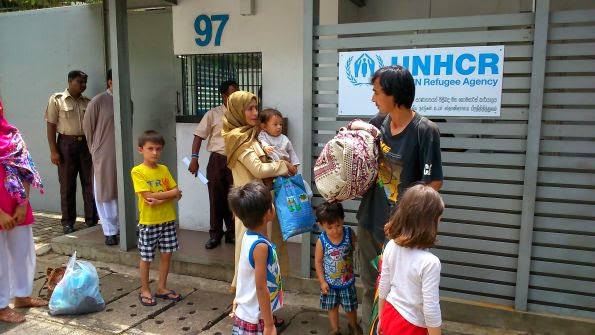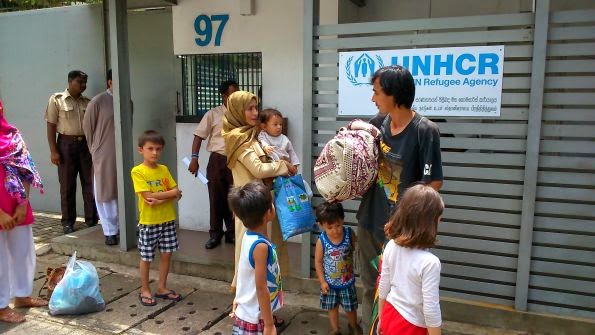The Economist
DOZENS of Pakistani asylum-seekers have been locked up in a detention camp in southern Sri Lanka following mass arrests that the UN’s refugee agency, UNHCR, says it never saw coming. The sweep started on June 9th in Negombo, a breezy seaside resort famous for its churches and beaches,on Sri Lanka’s west coast. Police went door-to-door with immigration officials and rounded up 142 men in seven days. Families wailed as the men were whisked away, without explanation, to a notorious prison known for housing terrorist suspects.
On July 3rd the government broadened the crackdown to include Afghans.
No charges have been pressed against the detainees. Most of the Pakistanis are members of Ahmaddiya, an Islamic sect regarded as apostate by Sunni Muslims in Pakistan. Smaller numbers of Christians and Shia Muslims were also arrested. On June 26th hundreds of Pakistanis gathered at the Fazl Ahmaddi Mosque to have their asylum papers renewed by a visiting UN team. They had been keeping a low profile since the arrests and were nervous about being out in the open. Groups of men kept watch at the gate.
The government says it will deport the detainees. It also threatens to send back all of the 1,547 asylum-seekers whose cases are being examined by the UNHCR. These include Afghans, Palestinians and Iranians, but the largest block, of 1,433, is comprised of Pakistanis. Chulananda Perera, the island’s controller general of immigration, accuses the visitors of abusing visa laws by entering as tourists and staying on against the government’s wishes. On the same day as the arrests started, his office suspended on-arrival visas for Pakistanis.
Although Sri Lanka does not allow asylum-seekers to settle, an agreement signed in 2005 with the UNHCR lets them stay until their cases are processed (typically, about two years) and until they are relocated to a third country. But a “working arrangement”, set out the following year, binds the refugee agency to asking immigration authorities whether they object to certain individuals remaining in the country.
Mr Perera says the government has “never accepted these people here”. His office repeatedly notified the UNHCR of this but their letters were not acknowledged, he says. (The refugee agency says it did not receive objections for at least eight months.) The arrests are almost certainly happening to please the new Indian government, which is worried that Pakistanis in Sri Lanka could pose a security threat. They came a fortnight after a meeting in New Delhi between President Mahinda Rajapaksa and Narendra Modi, India’s prime minister. Reports claim that they spoke then of the possibility of Pakistani militants using Sri Lanka as a base to plot attacks against India. The Pakistani government, which says asylum-seekers are economic migrants defiling the country’s image, says it wants nothing to do with them.
In 2013 the population of Pakistanis in Sri Lanka swelled. UNHCR statistics show a 744% increase in arrivals that year compared with 2012. They live predominantly in Negombo, renting space from the locals. They are barred from working and many depend on handouts or donations from churches and mosques. Some residents are now calling them “a nuisance”. Others say they are “harmless” but admit they are fearful of leasing houses to them after the recent arrests. One Pakistani Ahmadi woman—whose family of four has already been granted refugee status by the UNHCR and is awaiting relocation to Canada—said her landlady had brandished an umbrella in front of her, asking her family to “go, go, go”. The situation of the Pakistanis could worsen if the locals shut their doors to them, leaving them homeless.
The UNHCR is staunchly opposed to deportation. A spokesman said it would violate international laws and principles that restrain countries from forcibly returning asylum-seekers to places where they could face persecution. On July 2nd Human Rights Watch said Sri Lanka was threatening members of Pakistani minority groups with deportation “at the very time when persecution of these groups is escalating in Pakistan”.
UNHRC has asked for access to the detainees, but Sri Lanka’s government has only allowed the Red Cross to visit. And despite requests for information, the refugee agency has not been told what will become of these and other asylum-seekers. This could mean prolonged agony for the families, many of whom have young children. Having left Pakistan in search of better and safer futures, they have now found their lives upturned once again.
(Picture credit: The Economist)
The Economist

